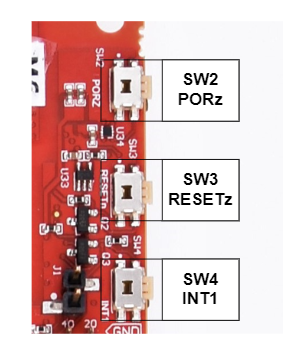SPRUJ10D May 2022 – September 2023
- 1
- Abstract
- Trademarks
- 1Preface: Read This First
- 2Kit Overview
- 3Board Setup
-
4Hardware Description
- 5.1 Functional Block Diagram
- 5.2 GPIO Mapping
- 5.3 Reset
- 5.4 Clock
- 5.5 Memory Interface
- 5.6 Ethernet Interface
- 5.7 I2C
- 5.8 Industrial Application LEDs
- 5.9 SPI
- 5.10 UART
- 5.11 MCAN
- 5.12 FSI
- 5.13 JTAG
- 5.14 Test Automation Header
- 5.15 LIN
- 5.16 MMC
- 5.17 ADC and DAC
- 5.18 EQEP and SDFM
- 5.19 EPWM
- 5.20 BoosterPack Headers
- 5.21 Pinmux Mapping
- 5References
- 6Revision History
3.2 Push Buttons
The LaunchPad supports multiple user push buttons that provide reset inputs and user interrupts to the AM263x SoC.
 Figure 3-5 Push Buttons
Figure 3-5 Push ButtonsTable 3-4 lists the push buttons that are placed on the top side of the AM263x LaunchPad.
Table 3-4 LaunchPad Push Buttons
| Push Button | Signal | Function |
|---|---|---|
| SW2 | PORz | SoC PORz reset input |
| SW3 | RESETz | SoC warm reset input |
| SW4 | INT1 | User Interrupt Signal |